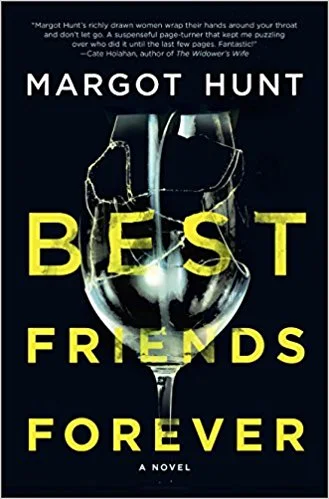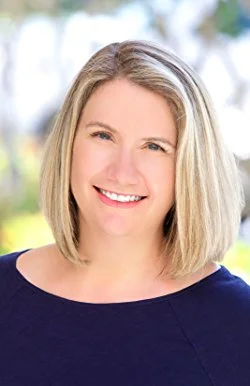Spotlight: Best Friends Forever by Margot Hunt
/Kat Grant and Alice Campbell have a friendship forged in shared confidences and long lunches lubricated by expensive wine. Though they’re very different women—the artsy socialite and the struggling suburbanite—they’re each other’s rocks. But even rocks crumble under pressure. Like when Kat’s financier husband, Howard, plunges to his death from the second-floor balcony of their South Florida mansion.
Howard was a jerk, a drunk, a bully and, police say, a murder victim. The questions begin piling up. Like why Kat has suddenly gone dark: no calls, no texts and no chance her wealthy family will let Alice see her. Why investigators are looking so hard in Alice’s direction. Who stands to get hurt next. And who is the cool liar—the masterful manipulator behind it all.
Excerpt
1
IT WAS A perfectly normal school morning in the Camp- bell household—disorganized, chaotic and at least one of my children was running around half-naked—right up until the moment the police arrived at our front door to question me in connection with the death of Howard Grant.
Before the doorbell rang—before everything changed— my most pressing concern was not to overcook the eggs I was scrambling for our breakfast.
I had learned through practice and error that the key to perfectly scrambled eggs was to keep the heat low. As I slowly stirred the eggs with a flat whisk, a flash of movement outside caught my eye. I turned to glance out the kitchen window, which overlooked our side yard and the street beyond. Our next-door neighbor Judy Ward was walking her fat dachshund, Rocket, down the sidewalk. Judy was carrying a green plastic bag of dog poop in one hand and Rocket’s leash in the other. The dog was panting so heavily, he looked like he was about to keel over.
“Mom, where’re my shorts?” Liam yelled from his room, which was located on the other side of our one-story house. When I didn’t answer, he shouted again. “Mom! I can’t find my uniform shorts!”
I drew in a deep breath and counted to five to stop myself from yelling back that if my son needed something, he should walk across the house and ask me politely. Sure enough, the thud-thud-thud of large thirteen-year-old feet stampeded across our ceramic tile floor. Liam appeared in the kitchen, wearing only a navy polo shirt with his school logo on it and white cotton briefs. Liam had my husband’s unruly dark curls and lopsided smile, but his wide, pale blue eyes and long, straight nose came from me. He was getting so tall, officially a teenager, but still child enough to run around in his underwear. I loved him so, this wild boy of mine.
“I can’t find any clean shorts,” Liam said. He balanced on one leg like a crane and began to hop in place.
“Why are you hopping?”
“Because I can,” Liam said carelessly. “Have you seen my shorts?”
“Did you look in the dryer?”
Liam snapped his fingers. “The dryer,” he repeated, draw- ing out the word and then hopping out of the room. I smiled, watching him go.
“Breakfast will be ready in five minutes. And don’t for- get your belt,” I called after him. Despite going to the same school with the same dress code for seven years, Liam still forgot to put on a belt at least every other day.
“I know!” he yelled back.
I turned the burner off under the eggs, pulled out a loaf of whole wheat bread from the pantry and started on the toast. I noticed that the pears in the wire fruit bowl were starting to look bruised. I picked one up, and the f lesh gave way, my fingers sinking into the rotten fruit. I shuddered and tossed it in the garbage.
“Mom?”
This time it was my daughter calling for me. Bridget, at eleven, was more organized than her older brother would
1 0
ever be. She was already dressed in her school uniform, the same blue polo with the crest embroidered on the left chest, tucked neatly into a knee-length khaki skirt. Her long strawberry blond hair—just a shade lighter than mine—was tied back in a low ponytail, and she was holding a piece of white poster board with pictures and snippets of text neatly glued to it. It was her state capital report, which she had diligently worked on for the past two evenings.
“How are you going to bring that into school?” I asked as I turned to the sink to wash my hands. “I don’t think it will fit in your backpack.”
“It won’t,” Bridget confirmed. “But it’s going to get all bent if I carry it in like this.”
“Maybe we can roll it up and put a rubber band around it,” I suggested. “Go see if Dad has one in the office.”
“Okay.” Bridget trooped off toward our home office. Todd habitually checked his email on the desktop computer there every morning as he drank his coffee.
“Liam, did you find your shorts?” I called out.
“Oh, right. I forgot to look,” he responded. There was another flurry of heavy footsteps, the metallic thwack of the dryer door being opened and slammed closed. “Got ’em!”
Bridget returned, this time with Todd trailing her. My husband was a tall, broad-shouldered man with milk-pale skin and dark eyes. Todd’s dark hair was still thick, but it was becoming increasingly streaked with gray. I’d also noticed that lately he’d started wearing his tortoiseshell reading glasses more frequently.
“I don’t have any rubber bands,” Todd said.
“Oh, no! What are we going to do?” Bridget asked fretfully, her voice thin and sharp. Yes, my daughter was far more organized than my son, but her moods shifted so much faster. Joy one moment, tears the next. I worried constantly
1 1
that the stormy emotional seas she traversed each day would one day capsize her.
“Don’t worry,” I soothed her. “Can’t you use a hair elastic?” Bridget brightened at this suggestion. “Oh, yeah! I didn’t think of that!” she said and scuttled off to the bathroom the children shared to find one of the four million hair elastics
that lived in the flotsam and jetsam of the drawers there.
Todd smiled at me. “Good save,” he said, crinkles appearing at the corners of his eyes. He rested a hand on my shoulder. “I have my moments,” I said, turning back to the sink so
that his hand fell away.
Todd had been trying lately. I had to give him credit for that, even if I wasn’t particularly charmed by his efforts. I wondered, fleetingly, if our marriage would ever return to the warm, secure place it had once been.
But then, before I could become too maudlin, remembering past happiness and the unlikeliness of its return, the doorbell rang. I looked up, wondering who it was. No one ever rang the doorbell before nine.
“Who do you think that is?” Todd asked.
I bit back my involuntary response. How should I know? Censoring oneself was necessary to a happy marriage. Or, in our case, to keeping an unhappy marriage from spiraling even further downward.
Buy on Amazon | Barnes and Noble
About Margot Hunt
Margot Hunt is the pseudonym of a bestselling writer of twelve previous novels. Her work has been praised by Publisher’s Weekly, Booklist and Kirkus Reviews. BEST FRIENDS FOREVER is her first psychological thriller.
Connect with Margot: Website | Facebook |
Giveaway: Enter to win one copy of Best Friends Forever! Just fill out the form below!
















































